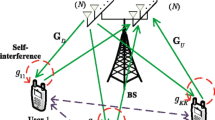Abstract
In a time-division duplex (TDD) system with massive multiple input multiple output (MIMO), channel reciprocity calibration (RC) is generally required in order to cope with the reciprocity mismatch between the uplink and downlink channel state information. Currently, evaluating the achievable spectral efficiency (SE) and energy efficiency (EE) of TDD massive MIMO systems with imperfect RC (IRC) mainly relies on exhausting Monte Carlo simulations and it is infeasible to precisely and concisely quantify the achievable SE and EE with IRC. In this study, a novel method is presented for tightly bounding the achievable SE of massive MIMO systems with zero-forcing beamforming under IRC. On the basis of the analytical results, we demonstrate key insights for practical system design with IRC in three aspects: the scaling rule for interference power, saturation region of the SE, and the bound on the SE loss. Finally, the trade-off between spectral and energy efficiencies in the presence of IRC is determined with algorithms developed to optimize SE (EE) under a constrained EE (SE) value. The loss of optimal total SE and EE due to IRC is also quantified, which shows that the loss of optimal EE is more sensitive to IRC in a typical range of transmit power values.
Similar content being viewed by others
References
Wang D M, Zhang Y, Wei H, et al. An overview of transmission theory and techniques of large-scale antenna systems for 5G wireless communications. Sci China Inf Sci, 2016, 59: 081301
Papazafeiropoulos A K, Ngo H Q, Ratnarajah T. Performance of massive MIMO uplink with zero-forcing receivers under delayed channels. IEEE Trans Veh Technol, 2017, 66: 3158–3169
Cao J, Wang D M, Li J M, et al. Uplink spectral efficiency analysis of multi-cell multi-user massive MIMO over correlated Ricean channel. Sci China Inf Sci, 2018, 61: 082305
Zhang Z S, Wang X, Zhang C Y, et al. Massive MIMO technology and challenges (in Chinese). Sci Sin Inform, 2015, 45: 1095–1110
Zhang Q, Jin S, Wong K K, et al. Power scaling of uplink massive MIMO systems with arbitrary-rank channel means. IEEE J Sel Top Signal Process, 2014, 8: 966–981
Dai J X, Wang J, Cheng C H, et al. Linear precoding based on a non-ideal Nakagami-m channel in a massive MIMO system. Sci China Inf Sci, 2017, 60: 069301
Ngo H Q, Larsson E G, Marzetta T L. Energy and spectral efficiency of very large multiuser MIMO systems. IEEE Trans Commun, 2013, 61: 1436–1449
Xu S, Zhang H, Tian J, et al. Pilot reuse and power control of D2D underlaying massive MIMO systems for energy efficiency optimization. Sci China Inf Sci, 2017, 60: 100303
Wei H, Wang D M, Wang J Z, et al. Impact of RF mismatches on the performance of massive MIMO systems with ZF precoding. Sci China Inf Sci, 2016, 59: 022302
Zhang W C, Ren H, Pan C H, et al. Large-scale antenna systems with UL/DL hardware mismatch: achievable rates analysis and calibration. IEEE Trans Commun, 2015, 63: 1216–1229
Shepard C, Yu H, Anand N, et al. Argos: practical many-antenna base stations. In: Proceedings of ACM Conference MOBICOM, Turkey, 2012. 53–64
Rogalin R, Bursalioglu O Y, Papadopoulos H, et al. Scalable synchronization and reciprocity calibration for distributed multiuser MIMO. IEEE Trans Wirel Commun, 2014, 13: 1815–1831
Vieira J, Rusek F, Tufvesson F. Reciprocity calibration methods for massive MIMO based on antenna coupling. In: Proceedings of IEEE GLOBECOM, Austin, 2014. 3708–3712
Liu D L, Ma W Z, Shao S H, et al. Performance analysis of TDD reciprocity calibration for massive MU-MIMO systems with ZF beamforming. IEEE Commun Lett, 2016, 20: 113–116
Luo X. Multiuser massive MIMO performance with calibration errors. IEEE Trans Wirel Commun, 2016, 15: 4521–4534
Mi D, Dianati M, Zhang L, et al. Massive MIMO performance with imperfect channel reciprocity and channel estimation error. IEEE Trans Commun, 2017, 65: 3734–3749
Ma W Z, Liu D L, Liu Y, et al. On the capacity of ZF beamforming in massive MIMO systems with imperfect reciprocity calibration. In: Proceedings of IEEE GLOBECOM, Singapore, 2017. 3708–3712
Minasian A, Adve R S, Shahbazpanahi S. The impact of hardware calibration errors on the performance of massive MIMO systems. In: Proceedings of IEEE GLOBECOM, Washington, 2016. 1–6
Bjornson E, Sanguinetti L, Hoydis J, et al. Optimal design of energy-efficient multi-user MIMO systems: Is massive MIMO the answer? IEEE Trans Wirel Commun, 2015, 14: 3059–3075
Liu D L, Zhao B, Wu F, et al. Semi-blind SI cancellation for in-band full-duplex wireless communications. IEEE Commun Lett, 2018, 22: 1078–1081
Suzuki H, Tran T V A, Collings I B, et al. Transmitter noise effect on the performance of a MIMO-OFDM hardware implementation achieving improved coverage. IEEE J Sel Areas Commun, 2008, 26: 867–876
Jungnickel V, Manolakis K, Zirwas W, et al. The role of small cells, coordinated multipoint, and massive MIMO in 5G. IEEE Commun Mag, 2014, 52: 44–51
Jin S, Wang J, Sun Q, et al. Cell coverage optimization for the multicell massive MIMO uplink. IEEE Trans Veh Technol, 2015, 64: 5713–5727
Wei H X, Li Y Z, Xiao L M, et al. Queue-aware energy-efficient scheduling and power allocation with feedback reduction in small-cell networks. Sci China Inf Sci, 2018, 61: 048301
Choi J, Oh H, Jeon H C. Propagation prediction for LTE small cells with antenna beam tilt. In: Proceedings of VTC-Fall, Vancouver, 2014. 1–5
Acknowledgements
This work was supported by National Natural Science Foundation of China (Grant Nos. 61531009, 61471108, 61771107, 61701075), the National Major Projects (Grant No. 2016ZX03001009), the Fund from the China Scholarship Council (Grant No. 201706070084), and the Fundamental Research Funds for the Central Universities.
Author information
Authors and Affiliations
Corresponding author
Rights and permissions
About this article
Cite this article
Liu, D., Wu, F., Quan, X. et al. Energy- and spectral-efficiency of zero-forcing beamforming in massive MIMO systems with imperfect reciprocity calibration: bound and optimization. Sci. China Inf. Sci. 61, 122302 (2018). https://doi.org/10.1007/s11432-018-9591-8
Received:
Revised:
Accepted:
Published:
DOI: https://doi.org/10.1007/s11432-018-9591-8




